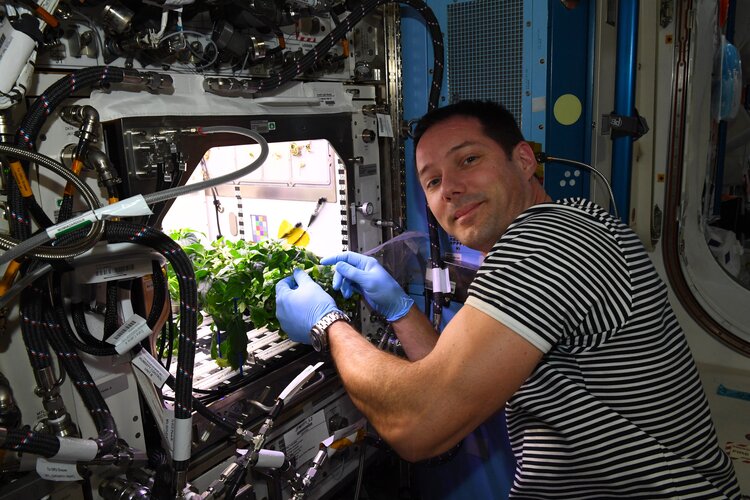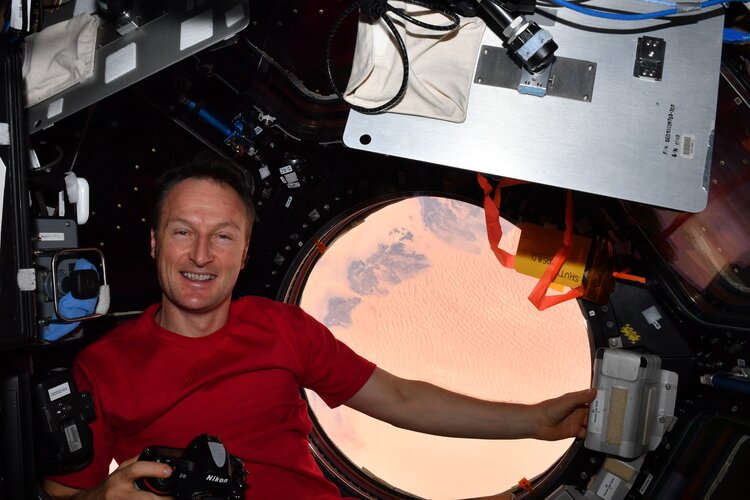Wanted: recycling methods to keep astronauts alive
Wednesday, 19 January 2022 12:28
It took a crop of potatoes to keep Matt Damon alive on the red planet in The Martian. And in future, real life astronauts on the Moon and Mars will have to be gardeners, farmers and expert recyclers as well as explorers. Do you have promising ideas that might help them to get by in space on next to no resources?
Watch: Matthias Maurer in-flight call to World Economic Forum
Wednesday, 19 January 2022 12:23
Join ESA astronaut Matthias Maurer on Thursday, 20 January, in a live call from the International Space Station, from 14:00 GMT/15:00 CET, talking with prominent experts and industry leaders, to explore how space research can improve life on our planet.
NASA's Curiosity rover measures intriguing carbon signature on Mars
Wednesday, 19 January 2022 12:06
Satellogic raises $150 million from fund led by former treasury secretary
Wednesday, 19 January 2022 11:01
A fund led by Steven Mnuchin, former treasury secretary, will invest $150 million into Earth imaging company Satellogic, helping close a delayed merger with a special purpose acquisition corporation (SPAC).
Private investment in space infrastructure hit record $14.5B in 2021
Wednesday, 19 January 2022 05:49 Private investment in space infrastructure companies hit a record-breaking $14.5 billion last year, according to a report Tuesday by New York City-based firm Space Capital.
The new report from the venture capital company shows space infrastructure investment in 2021 was more than 50% greater than the prior record set in 2020.
The report, which is also available in an interactive
Private investment in space infrastructure companies hit a record-breaking $14.5 billion last year, according to a report Tuesday by New York City-based firm Space Capital.
The new report from the venture capital company shows space infrastructure investment in 2021 was more than 50% greater than the prior record set in 2020.
The report, which is also available in an interactive Liberty Strategic Capital to invest $150 Million in Satellogic and CF Acquisition Corp V
Wednesday, 19 January 2022 05:49 Satellogic, a leader in sub-meter resolution satellite imagery collection, currently 70 centimeters, and CF Acquisition Corp., a special purpose acquisition company sponsored by Cantor Fitzgerald, announced that they have secured an additional $150 million private placement commitment from Liberty Strategic Capital ("Liberty"), a private equity firm founded and led by former U.S. Secretary of th
Satellogic, a leader in sub-meter resolution satellite imagery collection, currently 70 centimeters, and CF Acquisition Corp., a special purpose acquisition company sponsored by Cantor Fitzgerald, announced that they have secured an additional $150 million private placement commitment from Liberty Strategic Capital ("Liberty"), a private equity firm founded and led by former U.S. Secretary of th Manufacturing revenues for Earth observation to grow to $76.1 billion by 2030
Wednesday, 19 January 2022 05:49 Euroconsult, the leading space consulting and market intelligence firm, has released its eagerly awaited ''Earth Observation Satellite Systems Market'' report, providing a sweeping review analysis of the Earth Observation (EO) upstream ecosystem and breaking down government and commercial programs in exhaustive details.
With the Earth Observation manufacturing market gearing up for another
Euroconsult, the leading space consulting and market intelligence firm, has released its eagerly awaited ''Earth Observation Satellite Systems Market'' report, providing a sweeping review analysis of the Earth Observation (EO) upstream ecosystem and breaking down government and commercial programs in exhaustive details.
With the Earth Observation manufacturing market gearing up for another SpaceX launches 2,000th Starlink satellite from Florida
Wednesday, 19 January 2022 05:49 SpaceX successfully launched 49 Starlink satellites from Florida on Tuesday evening, bringing the total number of Starlinks launched to over 2,000.
The Falcon 9 rocket lifted off from Complex 39A at Kennedy Space Center just after 9 p.m. after it was originally scheduled for 7:04 p.m. EST but was delayed within 15 minutes of the original launch time.
Only 1,741 of the broadband Internet c
SpaceX successfully launched 49 Starlink satellites from Florida on Tuesday evening, bringing the total number of Starlinks launched to over 2,000.
The Falcon 9 rocket lifted off from Complex 39A at Kennedy Space Center just after 9 p.m. after it was originally scheduled for 7:04 p.m. EST but was delayed within 15 minutes of the original launch time.
Only 1,741 of the broadband Internet c Rocket Lab readies first 2022 Electron Launch, BlackSky adds another mission to manifest
Wednesday, 19 January 2022 05:49 Rocket Lab USA, Inc. has announced the launch window for its first Electron mission in 2022, a dedicated mission for BlackSky (NYSE: BKSY) through global launch services provider Spaceflight Inc.
Electron is scheduled to launch the "Without Mission A Beat" mission from Rocket Lab Launch Complex 1 in New Zealand during a launch window that opens February 4, 2022 UTC. The "Without Mission A
Rocket Lab USA, Inc. has announced the launch window for its first Electron mission in 2022, a dedicated mission for BlackSky (NYSE: BKSY) through global launch services provider Spaceflight Inc.
Electron is scheduled to launch the "Without Mission A Beat" mission from Rocket Lab Launch Complex 1 in New Zealand during a launch window that opens February 4, 2022 UTC. The "Without Mission A Under a moon spell: Shark attacks related to lunar phases
Wednesday, 19 January 2022 05:49 New research from LSU and the University of Florida suggests that more shark attacks occur during fuller phases of the moon. While the exact cause remains unclear, the researchers found that more shark attacks than average occur during periods of higher lunar illumination and fewer attacks than average occur during periods of lower illumination. Many different types of animals show behaviors tha
New research from LSU and the University of Florida suggests that more shark attacks occur during fuller phases of the moon. While the exact cause remains unclear, the researchers found that more shark attacks than average occur during periods of higher lunar illumination and fewer attacks than average occur during periods of lower illumination. Many different types of animals show behaviors tha Sols 3357-3360: Edging Closer and Closer to Panari
Wednesday, 19 January 2022 05:49 We continue to document rocks similar to what we saw at "The Prow," a dark appearing rock outcrop with amazing sedimentary structures and details. To do this, we need to get as close as possible to an outcrop surface but that has called for some short multi-plan drives, as we manoeuvre to a new feature called "Panari" (a length of roughly 20 metres away from The Prow).
In our last plan, we
We continue to document rocks similar to what we saw at "The Prow," a dark appearing rock outcrop with amazing sedimentary structures and details. To do this, we need to get as close as possible to an outcrop surface but that has called for some short multi-plan drives, as we manoeuvre to a new feature called "Panari" (a length of roughly 20 metres away from The Prow).
In our last plan, we Kazakhstan's President Fires Special Envoy To Baikonur Space Port
Wednesday, 19 January 2022 05:49 Kazakhstan's President Kassym-Jomart Tokayev has fired his special envoy to the Russia-leased Baikonur space port, his press office said on Monday.
"A decree of the head of state has relieved Serik Zhusipovich Suleimenov of his duties as the Kazakhstani president's special representative at Baikonur complex," the presidency said.
Serik Suleimenov was appointed envoy to Baikonur in th
Kazakhstan's President Kassym-Jomart Tokayev has fired his special envoy to the Russia-leased Baikonur space port, his press office said on Monday.
"A decree of the head of state has relieved Serik Zhusipovich Suleimenov of his duties as the Kazakhstani president's special representative at Baikonur complex," the presidency said.
Serik Suleimenov was appointed envoy to Baikonur in th New study sheds light on origins of life on Earth
Wednesday, 19 January 2022 05:49 Addressing one of the most profoundly unanswered questions in biology, a Rutgers-led team has discovered the structures of proteins that may be responsible for the origins of life in the primordial soup of ancient Earth.
The researchers explored how primitive life may have originated on our planet from simple, non-living materials. They asked what properties define life as we know it and c
Addressing one of the most profoundly unanswered questions in biology, a Rutgers-led team has discovered the structures of proteins that may be responsible for the origins of life in the primordial soup of ancient Earth.
The researchers explored how primitive life may have originated on our planet from simple, non-living materials. They asked what properties define life as we know it and c New spheres of knowledge on the origin of life
Wednesday, 19 January 2022 05:49 The shape of a cell affects its physical and chemical properties. Different cell types have developed different shapes to enable effective functioning. But what shape were the very first cells, as life began to evolve?
Primitive cells are thought to have been spherical, but experimental evidence supporting this belief remains elusive. Now, however, researchers from the University of Tsukub
The shape of a cell affects its physical and chemical properties. Different cell types have developed different shapes to enable effective functioning. But what shape were the very first cells, as life began to evolve?
Primitive cells are thought to have been spherical, but experimental evidence supporting this belief remains elusive. Now, however, researchers from the University of Tsukub 
 Image:
Crash test dummy
Image:
Crash test dummy